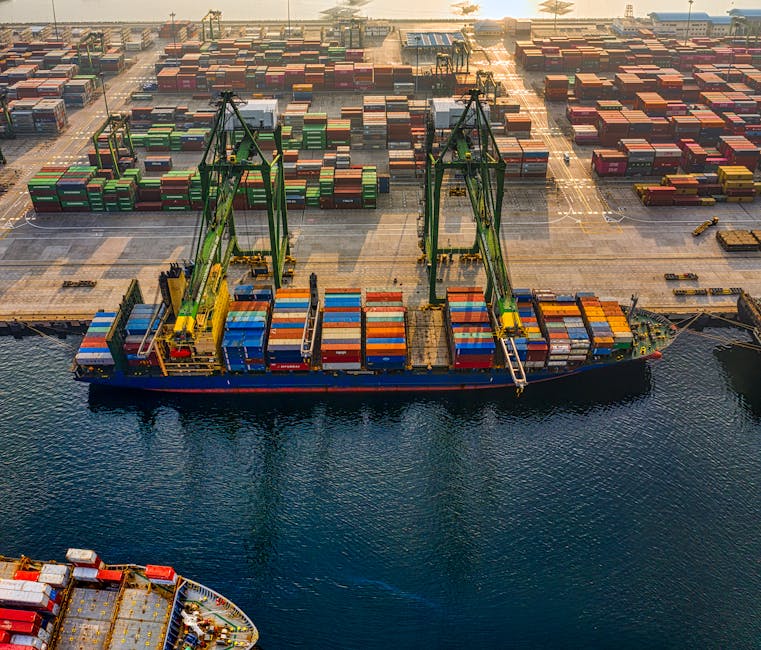Simplifying Maritime Supply Chain Complexity for Better Port Operations
Ports play a pivotal role in this vast network, connecting continents and facilitating the movement of goods on a massive scale.
Let’s dive into the complexities of this crucial system and explore how innovative solutions are streamlining port operations for efficiency and sustainability.
Understanding the intricacies of maritime supply chain
The maritime supply chain is a vast and interconnected web of processes that span the globe.
From the initial shipment of goods at the port of origin to the final delivery at the destination port, numerous stakeholders and intricate logistics come into play. Shipping lines, freight forwarders, customs officials, and port authorities all play crucial roles in ensuring the smooth flow of cargo through the supply chain.
At the heart of maritime supply chain operations are ports, serving as vital hubs that facilitate the loading, unloading, and transshipment of goods between different modes of transportation.
The efficiency of port operations directly impacts the overall fluidity and cost-effectiveness of global trade. Understanding these complexities is essential for optimizing supply chain processes and enhancing port performance.
Factors such as weather disruptions, geopolitical events, and fluctuating market demands add layers of complexity to maritime supply chains. Navigating these challenges requires a comprehensive understanding of the interconnected nature of global trade and a proactive approach to addressing issues before they escalate.
By streamlining processes and leveraging technology, ports can better manage these complexities and improve operational efficiency.
Challenges in maritime logistics and transportation
The maritime industry faces a myriad of challenges in its logistics and transportation operations.
One prominent issue is the optimization of shipping routes to minimize fuel consumption and reduce environmental impact. As sustainability becomes more and more of a key focus for businesses, finding ways to balance economic efficiency with environmentally friendly practices is critical for the long-term viability of maritime operations.
Port congestion and inefficiencies pose significant challenges to maritime supply chains, leading to delays in cargo handling and increased costs for shippers. Addressing these bottlenecks requires collaborative efforts among port authorities, shipping lines, and stakeholders to improve infrastructure, enhance communication, and implement innovative technologies that streamline operations.
Security concerns, such as piracy and cyber threats, also present ongoing challenges to maritime logistics. Protecting cargo, vessels, and port facilities from security risks such as these requires a multi-layered approach that integrates advanced security protocols, surveillance systems, and training for personnel.
Regulatory compliance and documentation accuracy are critical aspects of maritime logistics that demand meticulous attention to detail. Ensuring that shipments adhere to international trade regulations, customs requirements, and safety standards is essential for preventing delays, fines, and reputational damage. Implementing digital solutions for documentation management can streamline these processes and enhance overall efficiency.
IoT, AI, and blockchain: the innovative technologies revolutionizing port operations
The digital transformation of port operations is ushering in a new era of efficiency and transparency in maritime supply chains.
Advanced technologies such as Internet of Things (IoT) sensors, artificial intelligence, and blockchain are revolutionizing the way ports manage cargo, monitor assets, and optimize logistics processes.
IoT sensors embedded in containers and equipment enable real-time tracking and monitoring of shipments, providing stakeholders with valuable data on cargo location, condition, and handling. This visibility helps streamline supply chain operations, reduce delays, and enhance overall supply chain visibility.
Artificial intelligence algorithms are being deployed to optimize port operations, from predictive maintenance of equipment to predictive analytics for demand forecasting. By leveraging AI-powered insights, ports can improve resource allocation, enhance decision-making processes, and mitigate operational risks, ultimately increasing operational efficiency and reducing costs.
Blockchain technology is also transforming the way information is shared and verified in maritime supply chains. By creating secure, immutable records of transactions and cargo movements, blockchain enhances transparency, traceability, and security throughout the supply chain. Smart contracts automate contractual agreements, streamline documentation processes, and reduce administrative overhead, leading to faster and more secure transactions.
Automated technologies such as autonomous vehicles, robotic cranes, and drones are revolutionizing port operations by increasing speed, accuracy, and safety in cargo handling and storage. These innovations streamline operational processes, reduce labor costs, and minimize human error, enabling ports to enhance productivity and remain competitive in the global marketplace.
Investing in these digital and automated solutions not only modernizes port facilities but also positions them for future growth and competitiveness in an increasingly digitalized and connected world.
Efficiency and sustainability: key goals for port modernization
Efficiency and sustainability are at the forefront of port modernization efforts, shaping the future of maritime supply chains.
Ports are increasingly focused on reducing carbon emissions, minimizing environmental impact, and promoting eco-friendly practices to meet global sustainability goals and regulatory requirements.
Implementing green initiatives such as shore power systems, energy-efficient lighting, and eco-friendly terminal operations are key strategies for enhancing sustainability in port operations. These renewable energy sources can optimize resource use, while adopting eco-conscious practices allow ports to mitigate their environmental footprint and contribute to a greener, more sustainable maritime industry.
Adopting eco-friendly transportation solutions, such as alternative fuels, electric vehicles, and hybrid technologies, is also critical for reducing emissions and improving air quality in port environments.
Sustainable port practices not only benefit the environment but also contribute to operational efficiency and cost savings.
Streamlining the Future of Port Operations
As the maritime industry continues to evolve, the need for streamlined supply chain processes in port operations becomes increasingly paramount.
By leveraging innovative technologies and fostering a culture of efficiency and sustainability, ports can adapt to the ever-changing landscape of global trade.
Simplifying maritime supply chain complexities is not just a goal but a necessity for ensuring smoother port operations and seamless logistics.




